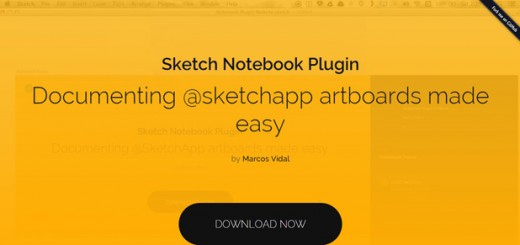Python is an easy to learn, powerful programming language. It has efficient high-level data structures and a simple but effective approach to object-oriented programming. Python’s elegant syntax and dynamic typing, together with its interpreted nature, make it an ideal language for scripting and rapid application development in many areas on most platforms.
There are number of Python Libraries out there and offer wide range of facilities, built in modules that provide access to system functionality such as file I/O that would otherwise be inaccessible to Python programmers, as well as modules written in Python that provide standardized solutions for many problems that occur in everyday programming.You can enroll in Python Training today to learn more about Python libraries.
Here is the list of Top 8 Python Libraries for Developers that provide quick fixes to immediate problems, but can also be used as the underpinnings for bigger projects.
Don’t Miss
1. Best Python Frameworks for Rapid Development
1. Pyglet
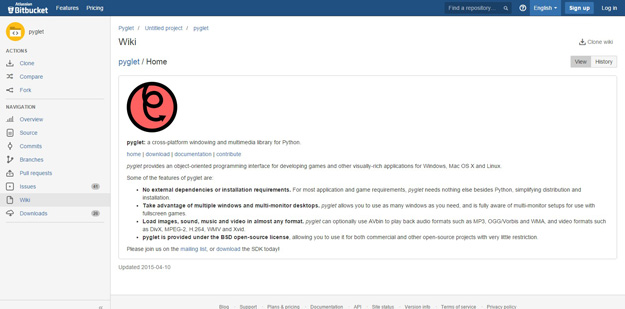
pyglet: a cross-platform windowing and multimedia library for Python, pyglet provides an object-oriented programming interface for developing games and other visually-rich applications for Windows, Mac OS X and Linux.
All of this is done through the native platform capabilities in Windows, OS X, or Linux, so there are no binary dependencies; it’s pure Python. It’s also BSD-licensed, so it can be included in any commercial or open source project.
2. Arrow
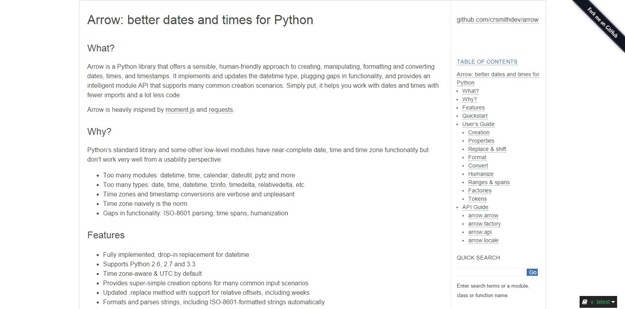
Arrow is a Python library that offers a sensible, human-friendly approach to creating, manipulating, formatting and converting dates, times, and timestamps. It implements and updates the datetime type, plugging gaps in functionality, and provides an intelligent module API that supports many common creation scenarios. Simply put, it helps you work with dates and times with fewer imports and a lot less code.
3. Splinter
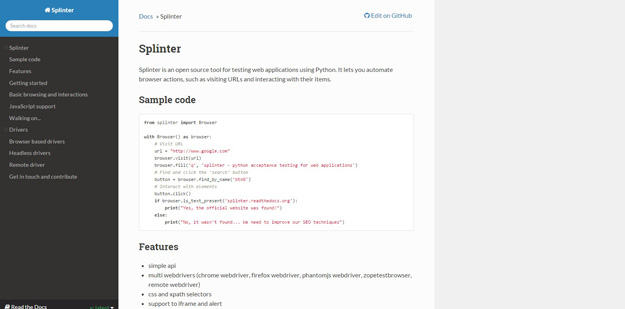
Splinter is an open source tool for testing web applications using Python. It lets you automate browser actions, such as visiting URLs and interacting with their items. requires drivers to work with a specific browser, but Chrome and Firefox are already covered, and it can use Selenium Remote to control a browser running elsewhere. You can even manually execute JavaScript in the target browser.
Splinter is useful if you want to find out how specific browsers behave when confronted with a given website.
3. PyGames
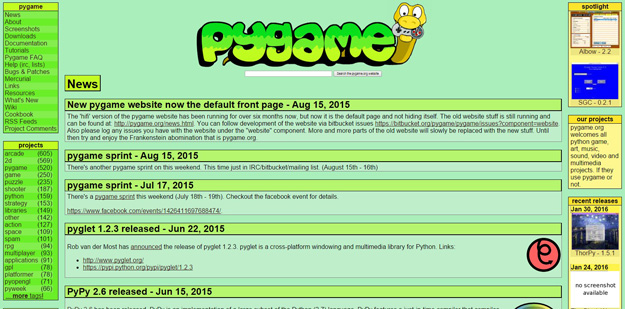
Pygame is a set of Python modules designed for writing games. Pygame adds functionality on top of the excellent SDL library. This allows you to create fully featured games and multimedia programs in the python language. Pygame is highly portable and runs on nearly every platform and operating system. Pygame itself has been downloaded millions of times, and has had millions of visits to its website.
Pygame is free. Released under the GPL License, you can create open source, free, freeware, shareware, and commercial games with it.
4. Invoke
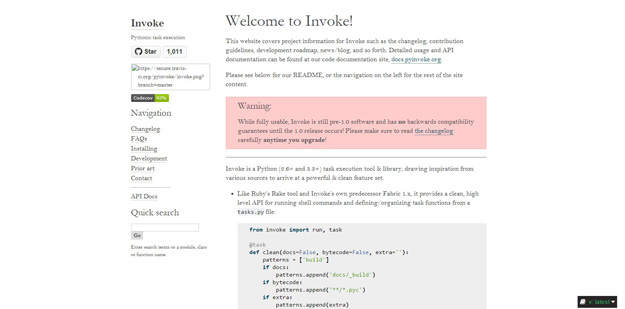
Invoke is a Python (2.6+ and 3.3+) task execution tool & library, drawing inspiration from various sources to arrive at a powerful & clean feature set. Using Python as a replacement for common shell scripting tasks makes sense, and Invoke provides common-sense solutions to take command-line tasks and manage them as if they were Python functions, allowing bigger items to be elegantly built around them.
5. Requests
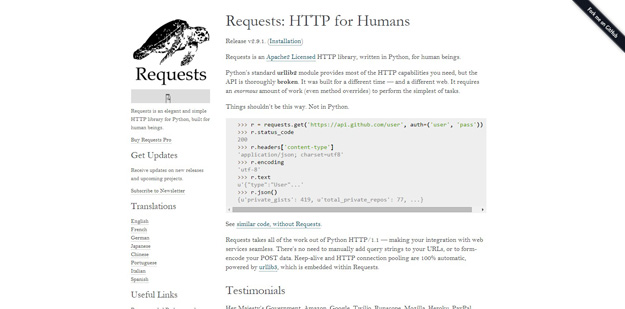
Requests is an Apache2 Licensed HTTP library, written in Python, for human beings. Most existing Python modules for sending HTTP requests are extremely verbose and cumbersome. Python’s builtin urllib2 module provides most of the HTTP capabilities you should need, but the api is thoroughly broken. It requires an enormous amount of work (even method overrides) to perform the simplest of tasks.
6. Peewee
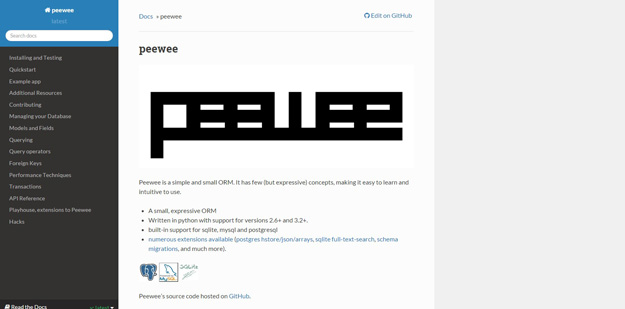
Peewee is a simple and small ORM. It has few (but expressive) concepts, making it easy to learn and intuitive to use.
Peewee provides a safe, programmatic path to access database resources, using a set of Python classes that are intuitive for both Python developers and database engineers. With Peewee, quick-and-dirty way to access a database can be later expanded to a more robust option without having to rip it out and start over. Transactions are natively supported, and optional modules provide support for everything from connection pooling to advanced field types like many-to-many.
7. Bottle
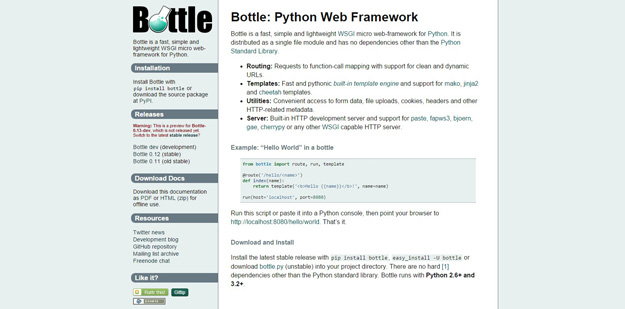
Bottle is a fast, simple and lightweight WSGI micro web-framework for Python. It is distributed as a single file module and has no dependencies other than the Python Standard Library.
You need it for routing, templates, access to request and response data, support for multiple server types from plain old CGI on up, and support for more advanced features like WebSockets — it’s all here.
The amount of work needed to get started is minimal, and Bottle’s design is elegantly extensible for when more advanced functions have to be plugged in.
8. PyGTK
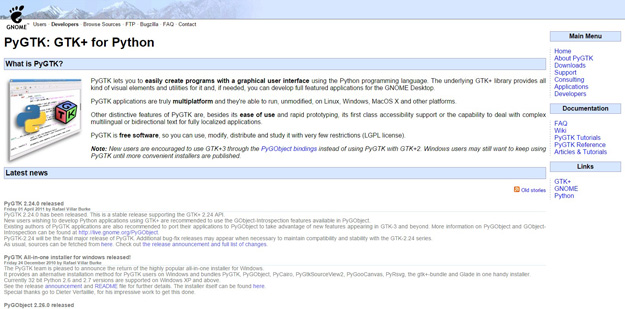
PyGTK lets you to easily create programs with a graphical user interface using the Python programming language. The underlying GTK+ library provides all kind of visual elements and utilities for it and, if needed, you can develop full featured applications for the GNOME Desktop.
PyGTK applications are truly multiplatform and they’re able to run, unmodified, on Linux, Windows, MacOS X and other platforms.
Other distinctive features of PyGTK are, besides its ease of use and rapid prototyping, its first class accessibility support or the capability to deal with complex multilingual or bidirectional text for fully localized applications.
PyGTK is free software, so you can use, modify, distribute and study it with very few restrictions (LGPL license).



